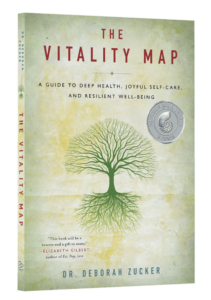One of the traps that I see most of us fall into on our health journeys is getting stuck with unhelpful ideas like, “I need to stick to ________ in order to be healthy,” or “If only I _______, then I’d be healthy.” This orientation can create a lot of rigidity, self-judgments, and a very narrow, linear path to how we relate with our self-care.
Not only does that not feel good, it also doesn’t tend to be very effective at supporting our well-being. There is nothing static or fixed in life; life itself is always moving, changing, and evolving, and our approach to nourishing our own vitality needs to be flexible and adaptable to align with that flow.
You might grab a piece of paper now and see if you can fill in the blank for each of those sentences above. Don’t think about it too much or edit yourself. Simply see what is there in your consciousness. Let yourself be surprised.
Here are some common responses I’ve seen from participants in my workshops:
- “I need to stick to a regime of going to the gym five times a week in order to be healthy.”
- “I need to stick to my diet and stop eating ice cream in order to be healthy.”
- “I need to lose 40 pounds in order to be healthy.”
- “I need to go to bed by 10:00 p.m. in order to be healthy.”
Obviously, we all have our own versions of these statements. When you look at yours, how do they feel to you? Are you living up to your own expectations? Because that’s what these are. Expectations. Ideals we compare ourselves to, and judge ourselves against.
Are we “doing it right” or are we “doing it wrong”? These statements are, more often than not, absolute statements, lines drawn in the sand between what we consider to be “success” and what we consider to be “failure.” I’m sure you know which side of that line you tend to find yourself on.
Here’s the thing: You are complex and nuanced. And you are constantly changing, growing, and evolving. The contexts in your life are always changing—your jobs, relationships, homes, passions. Think back to fifteen years ago. Who were you then? What was different about your life, preferences, and priorities? Quite a lot, I imagine!
Your orientation to self-care needs to be allowed to evolve and move with you; otherwise you are setting yourself up for entering a never-ending cycle of failure, self-judgment, and shame.
There is nothing linear or static in a vital life. All you need to do is look out in nature to see how true and undeniable this is. Life is always evolving. In her book Maps to Ecstasy, Gabrielle Roth writes,
“Disease is inertia. Healing is movement. If you put the body in motion, you will change.”[i]
Just as a gardener tries out what she thinks will best support her plants, monitoring them carefully to see how they respond, so you can garden yourself in the same way: if you aren’t thriving in the way you want to be, you can experiment with different strategies for nourishment and support. A good gardener knows that when you are tending life, there is no prescription that works every time.
The environment is always changing—weather patterns, the mineral content in the soil, the health of the fungi and bacteria that add vital nutrients and influence the way in which the earth drains or holds water. Add to that the diversity of the seeds and the uniqueness of how each plant responds, and you can see that no matter how much science has advanced in large-scale agriculture there are ongoing challenges that make gardening and farming far from an exact science.
You, too, are dynamic and move in a constantly changing ecosystem of your own life circumstances, relationships, and priorities. Take the advice of Eckhart Tolle, author of The Power of Now:
“Give up defining yourself—to yourself or to others. You won’t die. You will come to life.”[ii]
By embracing an orientation of experimentation, you are able to honor and celebrate your evolution. You are able to easefully adapt and be flexible. You are able to dance with life, creatively and playfully. And the freedom you experience in this will play a huge role in your healing.
This is an excerpt from my new book, The Vitality Map: A Guide to Deep Health, Joyful Self-Care, and Resilient Well Being.
Works Cited:
[i] Gabrielle Roth, Maps to Ecstasy, (New World Library, 1998), 178.
[ii] Eckhart Tolle, A New Earth: Awakening to Your Life Purpose, (Penguin, 2005), 109.



Thanks, Deb. Great article. This just might be the key that finally unlocks my challenge with clutter.
Wonderful, Marti!